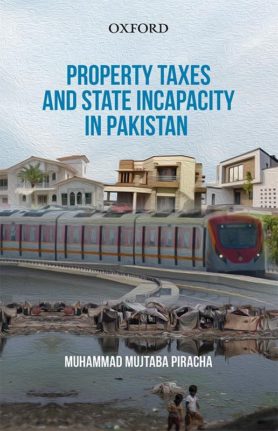This book shows how Pakistan’s inability to collect taxes reflects a broader disconnection between the state and its citizens, which translates into growing fiscal deficits, poor service delivery, increasing socio economic inequalities and low democratic accountability. Through extensive primary fieldwork, which included original interviews with tax bureaucrats and policymakers, detailed archival work and analysis of tax collection, Mujtaba Piracha truly shows how property taxation is a grudging political bargain, a permanent dispute or a strategic collusion between local wealthy taxpayers, intermediate tax collectors, and tax authorities, to minimize their duties and raid the fiscal commons.
- This is a must-read book for anyone interested in understanding the persistence of low-level equilibrium in state capacity in developing countries.
- This book helps deepen our understanding of state-citizen engagement in Pakistan’s particularly difficult context, especially around its struggles with establishing stable local governments—a level of government that is essential to many of its citizens most demanded services—and establishing a progressive tax regime. It ably brings together these two essential facets of governance, and in the great tradition of ethnographies of the state, takes us deep into a barely understood but absolutely central part of the state apparatus in Pakistan.
- This book examines the reasons for low local taxes in Pakistan, but it is unbelievably multifaceted. It provides a rich description of the institutional architecture of Pakistan’s federal fiscal system, analyses the perverse incentives it creates for local tax effort, presents rich primary evidence on the incentives created by the formal and informal arrangements that govern property taxation, and addresses issues of public policy.
- The book is a richly illustrated study of how the real tax system works, the values and work styles of the property tax collectors and the role political economy, informality and constant negotiation between collectors and property holders play in creating an equilibrium that ensures low collection.
- This book makes a significant contribution to our understanding of the political determinants of taxation in emerging economies.
Reviews
‘This book helps deepen our understanding of state-citizen engagement in Pakistan’s particularly difficult context, especially around its struggles with establishing stable local governments—a level of government that is essential to many of its citizens’ most demanded services—and establishing a progressive tax regime. It ably brings together these two essential facets of governance, and in the great tradition of ethnographies of the state, takes us deep into a barely understood but absolutely central part of the state apparatus in Pakistan.’
Shandana Khan Mohmand, Governance Cluster Leader and Research Fellow, Institute of Development Studies, University of Sussex, UK
‘This book examines the reasons for low local taxes in Pakistan, but it is unbelievably multifaceted. It provides a rich description of the institutional architecture of Pakistan’s federal fiscal system, analyses the perverse incentives it creates for local tax effort, presents rich primary evidence on the incentives created by the formal and informal arrangements that govern property taxation, and addresses issues of public policy. The contribution is a richly illustrated study of how the real tax system works, the values and work styles of the property tax collectors and the role political economy, informality and constant negotiation between collectors and property holders play in creating an equilibrium that ensures low collection. The book is a must read for reformers and academics.‘
Ali Cheema, Associate Professor of Economics, LUMS
About the author
Dr Muhammad Mujtaba Piracha is Pakistan’s Ambassador to the World Trade Organisation in Geneva since 2019, where he is currently the Chair of the Committee on Trade and Development. He is a graduate of the London School of Economics and Political Science and undertook his doctoral studies at the Institute of Development Studies at Sussex. Dr Piracha has worked across Pakistan in both the government and non-government sectors. Some of his previous assignments include Additional Chief Secretary (Services), Commissioner Lahore, Secretary Industries, Commerce, Investment and Skills Development in Punjab; Program Economist at the Aga Khan Rural Support Program; and multiple field assignments in Balochistan.
